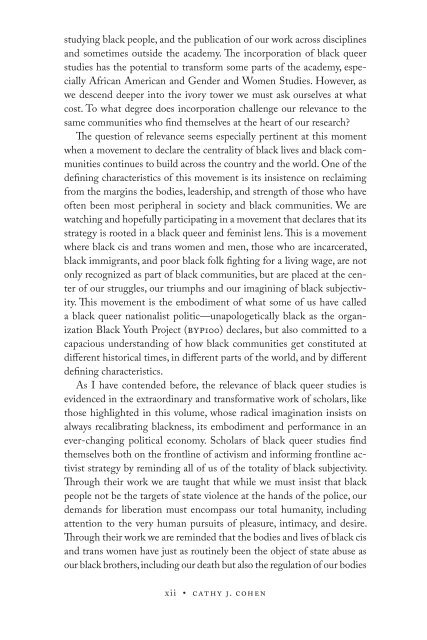No Tea
89AS6wvrf
89AS6wvrf
Create successful ePaper yourself
Turn your PDF publications into a flip-book with our unique Google optimized e-Paper software.
studying black people, and the publication of our work across disciplines<br />
and sometimes outside the acad emy. The incorporation of black queer<br />
studies has the potential to transform some parts of the acad emy, especially<br />
African American and Gender and Women Studies. However, as<br />
we descend deeper into the ivory tower we must ask ourselves at what<br />
cost. To what degree does incorporation challenge our relevance to the<br />
same communities who find themselves at the heart of our research?<br />
The question of relevance seems especially pertinent at this moment<br />
when a movement to declare the centrality of black lives and black communities<br />
continues to build across the country and the world. One of the<br />
defining characteristics of this movement is its insistence on reclaiming<br />
from the margins the bodies, leadership, and strength of those who have<br />
often been most peripheral in society and black communities. We are<br />
watching and hopefully participating in a movement that declares that its<br />
strategy is rooted in a black queer and feminist lens. This is a movement<br />
where black cis and trans women and men, those who are incarcerated,<br />
black immigrants, and poor black folk fighting for a living wage, are not<br />
only recognized as part of black communities, but are placed at the center<br />
of our strug gles, our triumphs and our imagining of black subjectivity.<br />
This movement is the embodiment of what some of us have called<br />
a black queer nationalist politic— unapologetically black as the organization<br />
Black Youth Proj ect (BYP100) declares, but also committed to a<br />
capacious understanding of how black communities get constituted at<br />
differ ent historical times, in differ ent parts of the world, and by differ ent<br />
defining characteristics.<br />
As I have contended before, the relevance of black queer studies is<br />
evidenced in the extraordinary and transformative work of scholars, like<br />
those highlighted in this volume, whose radical imagination insists on<br />
always recalibrating blackness, its embodiment and per for mance in an<br />
ever- changing po liti cal economy. Scholars of black queer studies find<br />
themselves both on the frontline of activism and informing frontline activist<br />
strategy by reminding all of us of the totality of black subjectivity.<br />
Through their work we are taught that while we must insist that black<br />
people not be the targets of state vio lence at the hands of the police, our<br />
demands for liberation must encompass our total humanity, including<br />
attention to the very human pursuits of plea sure, intimacy, and desire.<br />
Through their work we are reminded that the bodies and lives of black cis<br />
and trans women have just as routinely been the object of state abuse as<br />
our black brothers, including our death but also the regulation of our bodies<br />
xii • Cathy J. Cohen


